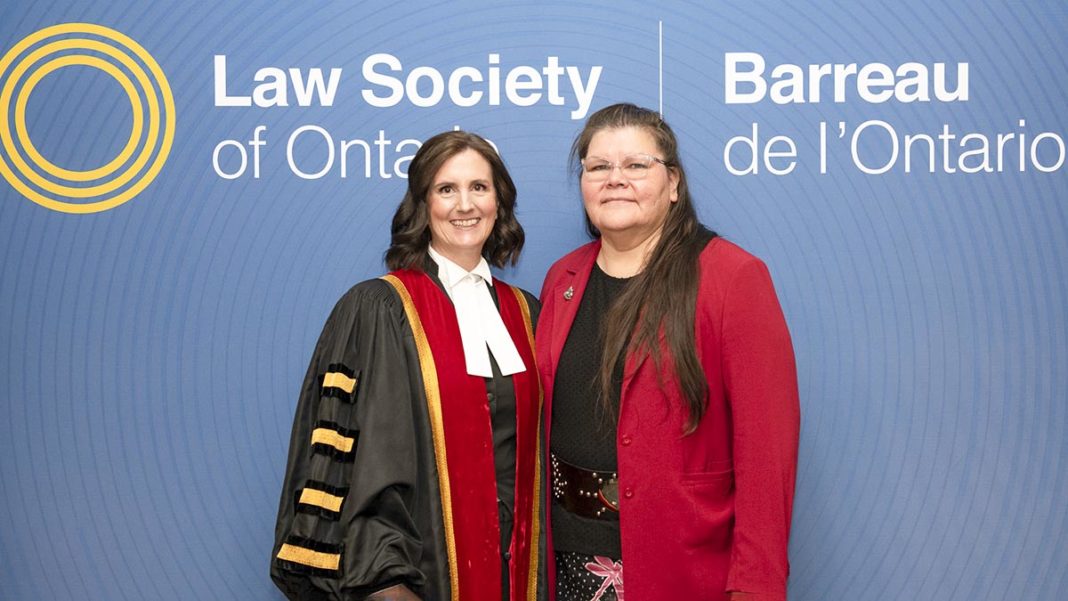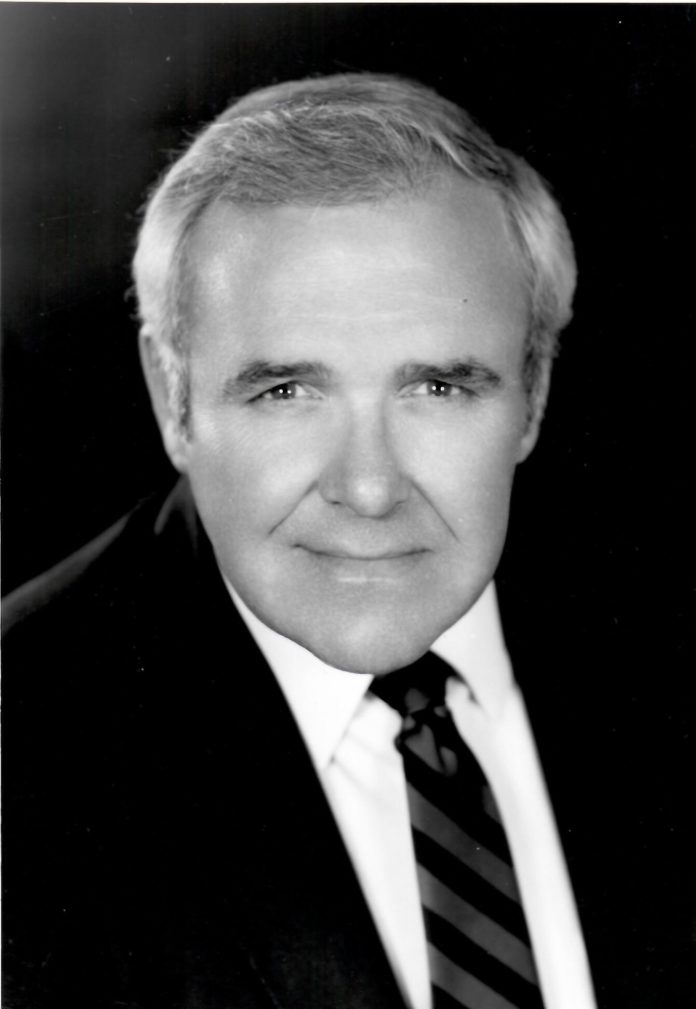TORONTO—Marian Jacko of Wiikwemkoong Unceded Territory is one of several members of Ontario’s legal profession who have received award from the Law Society of Ontario (LSO), recognizing their excellence.
“We are here to celebrate the 2022 law society awards,” stated Teresa Donnelly, treasurer of the LSO, at the awards ceremonies held in Osgoode Hall in Toronto, on May 25. “We are presenting the William J. Simpson distinguished paralegal award, Lincoln Alexander award, Laura Legge award, J. Shirley Denison award, and law society medals.
“It is so good to be here this evening. There is such a buzz and excitement in the room. Not only with award recipients being here, but because this event has brought us altogether,” said Ms. Donnelly. “Members of Ontario’s legal professions will be recognized for their outstanding career achievements and contributions to their communities. These awards recognize excellence. The award winners provide outstanding service and leadership, and promote well being and public service.”
“Each of these recipients is a role model, inspiration and leader for their colleagues. They are the highest awards granted by the Law Society of Ontario,” said Ms. Donnelly. In outlining Ms. Jacko being chosen for the Laura Legge Award, “this award has special significance to me,” she said, noting the award was first presented in 2007. “This year’s recipient is from Manitoulin Island and a trailblazer in the legal profession.”
“In the letter of support for Ms. Jacko it was stated that it is critical to have leadership, and perspective. As the mother of three children, Marian brings her heart and mind to her work,” said Ms. Donnelly. She explained, “the Laura Legge Awards recognizes women lawyers from Ontario who have exemplified leadership within the profession. The award was established in 2007 in honour of the late Laura Legge, Ont, QC, the first woman ever elected as a bencher of the Law Society and the first woman to serve as its treasurer.”
“Marian Jacko was called to the Bar in 1998, and has made significant contributions to the legal profession by advancing access to justice for children, youth, Indigenous communities, victims of crime and survivors of human trafficking,” said Ms. Donnelly.
“A compassionate leader, Ms. Jacko always puts her clients first and takes a trauma-informed approach to representing children’s interests. She does so with empathy, integrity and deep emotional intelligence,” said Ms. Donnelly. “Ms. Jacko also led the establishment of an innovative program for survivors of human trafficking to obtain restraining orders against their trafficker.”
“She is a generous leader and mentor who provides leadership and guidance to younger lawyers and to the community through her extensive volunteer work. As the first Indigenous person appointed as the Children’s Lawyer for Ontario, Ms. Jacko is a trailblazer, leaving important footprints for Indigenous and younger lawyers to follow.”
One of Ms. Jacko’s volunteer activities is serving as the president of the Little NHL youth hockey tournament board.
Ms. Jacko, upon receiving the award, introduced herself in Anishnaabemowin. “What I was speaking is the Anishnaabe language. Translated, my spirit name Waseyaubino kwe means Coming Dawn Woman. The second thing I said is that I belong to the bear clan; the clans are very important to us because they tell us what our roles and responsibilities are in our families and in our communities.”
“I am pleased, very honoured and humbled to accept the Laura Legge award and to join past recipients whom I have long admired and respected, including Kimberly Murray,” said Ms. Jacko. “A very special thanks/miigwetch to those who nominated me and those who supported my nomination.”
“I want to begin by acknowledging the strength of Indigenous women, girls, two-spirit and gender diverse people. I want to acknowledge those who have gone before us and who have made their journeys to the spirit world, including my parents Art and Veronica,” said Ms. Jacko.
“I also want to acknowledge survivors of Indian residential schools (IRS) and your courage and your resiliency,” continued Ms. Jacko. “And I want to acknowledge the spirits of those little ones who lost their lives in IRS and who are being uncovered in unmarked graves.”
“And finally I want to acknowledge everyone who is here today and I would like to publicly recognize and thank my family, my children, Brandon, Waskoness and Thuraya, and my husband James who are here with me today. I also want to celebrate that, in addition to being a daughter, mother, sister, auntie, I am now also a grandmother of two beautiful grandsons, Dominic and Takoda,” said Ms. Jacko.
Ms. Jacko told the gathering she was raised in Wiikwemkoong and is one of 11 children to her parents. “Growing up, we lived off the land. My father was a hunter, fisherman, trapper, farmer, and that was during his spare time while he worked full-time as the chief of police on our reserve. My mother worked as a nurse at the Wikwemikong Nursing Home. Growing up, we learned very early the value of hard work. Something that I have in common with the late Laura Legge.”
In November 2016, Ms. Jacko was appointed the children’s lawyer for Ontario. “I am very honoured to be the first Anishnawbek lawyer appointed to this position.” After accepting the position, she visited her brother Art Jr., a traditional person and knowledge keeper, asking him to help her with a special ceremony, a preparation lodge, a sweat lodge.
She explained, “the purpose of my request for this ceremony was so that I could come to the role of children’s lawyer for Ontario with the purest of hearts because I would be working with and helping children. I’ve always been taught that children are gifts from our creator and that they are not ours but rather, they are on loan to us.”
In the ceremony, Ms. Jacko was gifted with a turtle shell rattle. “The turtle shell is significant because it is symbolic and speaks about and represents Debwewin. Translated, Debwewin means truth. I share this with you because as practitioners and decision makers, you all have a responsibility to find Debwewin or come as close to it as you can.”
Since last summer, Ms. Jacko has been on leave from the office of the Children’s Lawyer and has been acting as the Assistant Deputy Attorney General for the Indigenous justice division. “In this new role, what I have heard repeatedly is, that Indigenous women must lead this work; that Indigenous communities know what is needed and that they have always known what was needed; and that we must commit to decolonizing the systems that continue to put Indigenous lives at risk.”
“It has been long recognized that Indigenous people are over-represented in the criminal system, as survivors, as accused persons and as persons in custody. Several inquiries, commissions, task forces and research studies have made direct links between the historical and ongoing colonial laws, policies, systems, and the over-representation of Indigenous persons in the Canadian criminal system,” continued Ms. Jacko.
“To redress the legacy of Indian Residential Schools and advance the process of reconciliation, the Truth and Reconciliation Commission of Canada made 94 calls to action, including justice-specific recommendations,” said Ms. Jacko. “I think the fact that it took decades to call the National Inquiry into Murdered and Missing Indigenous Women and Girls (MMIWG) says so much about our society. The fact that the commission made 231 calls for justice is a huge sign of the work that needs to get done.”
“The fact is, there is never enough time to unpack all that Indigenous women, girls, gender diverse, people and communities have been telling us, about what it is, that they need, we need, to be secure and to stay safe,” said Ms. Jacko. “But we must make the time. It is necessary. We must listen, learn, unlearn and, most importantly, we must change. It is time to change the narrative; particularly the narrative for Indigenous women to one of resilience.”
“I am very honoured and very humbled to be recognized and to accept the Laura Legge award, an award that recognizes women lawyers from Ontario who have exemplified leadership with the profession,” said Ms. Jacko. “Before I conclude my remarks, I would like to share an elder’s teaching that is so simple but profound. As we look around the world today, it is a time of great change. As an Anishnawbe kwe, there is much for which to be grateful and there is so much work to be done.”
“The elder said that when we are making important decisions or creating new ways of doing things, we must always think about the impact that these decisions or new ways will have on our future generations. We are often encouraged to think seven generations into the future and we need to take time. For if we move too quickly, we will create dust on our path and those coming behind us will become lost. As we continue to trailblaze, our challenge is to continue to leave footprints and to make our ancestors proud.”




